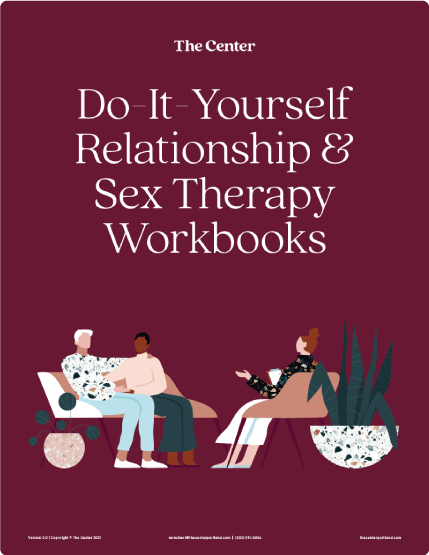How to Navigate Mismatched Sexual Desire in Your Relationship
Have you ever found yourself ready to head to the bedroom, only to realize your partner isn’t quite on the same page? Or maybe it feels like you’re always the one initiating, constantly trying to figure out your partner’s interest level and feeling unsure about when—or if—they’ll reciprocate.
Mismatched sexual desire is a common issue in relationships. It can leave both partners feeling disconnected, frustrated, and even rejected. One partner might crave more frequent physical intimacy, while the other might feel overwhelmed or just out of sync.
So, how do you navigate this imbalance? How can you find a middle ground where both of your needs are met without pressure, guilt, or resentment?
Getting on the same page about sex and intimacy doesn’t mean your desires and drive have to align perfectly. It’s about finding a way to honor both your own needs and those of your partner.
Let’s explore some practical steps to help you navigate this tricky territory to create a balanced, connected, and fulfilling relationship.
Practical Ways to Navigate Mismatched Sexual Desires
Open Up the Lines of Communication
The first step in addressing differences in sexual desire is to talk about it openly and honestly. Keep in mind that these conversations require vulnerability on all sides.
Enter the conversation with a focus on expressing YOUR feelings and needs. Use “I” statements, like, “I feel disconnected when we don’t have time for intimacy,” or “I need more downtime to feel ready for sex.”
Talking in a manner about YOUR personal needs, rather than what your partner is doing wrong, minimizes the chance that your partner will feel attacked and be on the defensive.
It’s not your job to convince your partner to change. It’s about sharing your experiences and finding common ground.
Understand the Root Causes
The next step is to try to find out what’s really going on, as mismatched desire often goes beyond simple differences in libido or sex drive.
Stress, fatigue, health issues, emotional disconnect, and even past traumas can all impact sexual interest. Take time to explore what might be affecting both you and your partner.
Are there underlying stressors or lifestyle factors that are contributing to the imbalance?
For example, if your partner is juggling work stress or dealing with body image concerns, it can significantly affect their sexual desire. Understanding the “why” behind your differences will help you come up with targeted solutions and create a deeper empathy for each other.
Focus on Quality Not Frequency
Are you worried because you don’t think you have enough sex?
What if instead of fixating only on how often you’re having sex, you focus on the quality of your intimate moments?
Meaningful connection doesn’t always have to involve intercourse — cuddling, kissing, or simply spending quiet time together can also create deep intimacy.
Find ways to be close that feel comfortable for both of you. This shift in perspective can lower the pressure you feel to meet a “specific quota” and help you enjoy your connection. The hope is that this will create a more fulfilling and less stressful sexual dynamic.
Take the Pressure Off
This leads to one of the biggest challenges in managing differences in desire: feeling pressure.
Pressure to be intimate a certain amount of times a week or in a specific way can make intimacy feel like an obligation rather than a choice.
Instead, try to create an environment where intimacy can unfold naturally.
This could look like scheduling dedicated time without the explicit expectation of sex or initiating physical touch in ways that don’t always lead to the bedroom.
When both partners feel free to express affection without strings attached, it can reduce anxiety and make sexual connection feel more organic and mutually satisfying.
Set Realistic Expectations
If you are making physical intimacy a priority in your relationship, finding a middle ground often requires compromise from all partners.
This might mean agreeing on a level of sexual activity that feels manageable and satisfying for both of you.
For example, if one of you prefers frequent intimacy while the other needs more space, you might negotiate a schedule that balances both needs.
It’s also important to set realistic expectations—understanding that your sexual dynamic will ebb and flow over time.
Consider Scheduling Sex
The movies always show spontaneous sex…. But most of the time, that isn’t the reality for real-life relationships.
Spontaneity in sex is exciting, but in long-term relationships, when navigating busy schedules, kids, or work stress, balancing spontaneous moments with planned intimacy can actually work.
Scheduling time for sex might feel unromantic at first, but it can help make sure you are prioritizing your relationship no matter what is going on around you.
This doesn’t mean that there will never be a time when the mood hits, and you need to sneak off to the bedroom. But it does mean that there’s time built into your day and week just for your relationship.
How Sex Therapy Can Help
If you’ve tried to work on it, but you still can’t get on the same page as your partner, meeting with a sex therapist or couples counselor can be incredibly beneficial.
In couples therapy, you’ll uncover any deeper issues leading to mismatched sexual desires, improve your communication, and find personalized strategies for reconnecting.
Sex therapy provides a neutral space to talk about your concerns and explore solutions without judgment, helping all partners feel heard and supported.
This doesn’t have to be a source of ongoing conflict or disconnect. By approaching the issue with empathy, open communication, and a willingness to explore different forms of intimacy, you can find a balance that honors both your needs and those of your partner.
Need some extra support?
Our team is ready to help. Schedule a consultation and start working towards a more satisfying sex life and fulfilling partnership.







